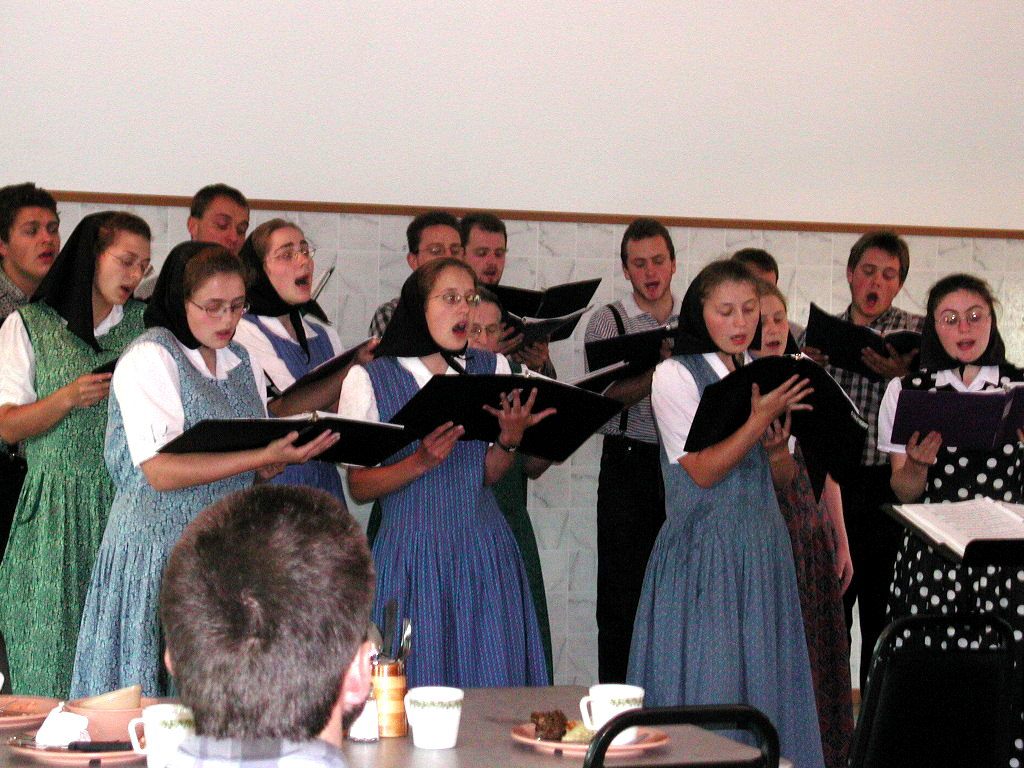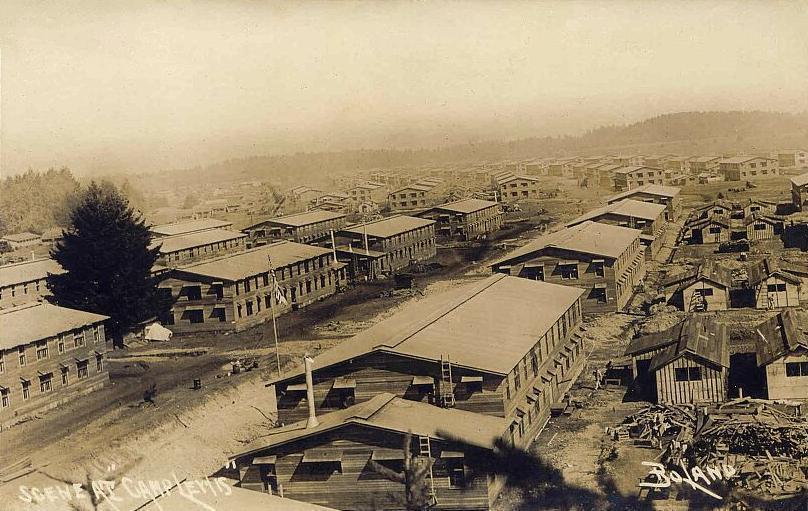|
Lehrerleut
The Lehrerleut, also Lehrerleit, are a branch of the Hutterites that emerged in 1877. They are the most traditional branch of the Hutterites. History Thirteen Hutterite families under the leadership of Jacob Wipf (1835–1896) emigrated from Johannesruh, Ukraine, to South Dakota in 1877, where they after their arrival formed the Lehrerleut by establishing a community of goods at Elmspring Colony near Parkston, South Dakota, thus following the example of the Schmiedeleut and the Dariusleut. The group's leader was a teacher (German: ''Lehrer''), hence their name ''Lehrerleut'' ("teacher people"). Shortly after World War I, two Hutterite conscientious objectors from the Lehrerleut branch, Joseph and Michael Hofer, died in an American prison. This and growing anti-German sentiment caused the emigration of all four Lehrerleut colonies to Alberta, Canada, in the following years. In 1945, the Lehrerleut started to form new colonies in Montana, thus returning to the United States. De ... [...More Info...] [...Related Items...] OR: [Wikipedia] [Google] [Baidu] |
Hutterite
Hutterites (german: link=no, Hutterer), also called Hutterian Brethren (German: ), are a communal ethnoreligious branch of Anabaptists, who, like the Amish and Mennonites, trace their roots to the Radical Reformation of the early 16th century and have formed intentional communities. The founder of the Hutterites, Jacob Hutter, "established the Hutterite colonies on the basis of the Schleitheim Confession, a classic Anabaptist statement of faith" of 1527, and the first communes were formed in 1528. Since the death of Hutter in 1536, the beliefs of the Hutterites, especially those espousing a community of goods and nonresistance, have resulted in hundreds of years of diaspora in many countries. The Hutterites embarked on a series of migrations through central and eastern Europe. Nearly extinct by the 18th century, they migrated to Russia in 1770 and about a hundred years later to North America. Over the course of 140 years, their population living in community of goods recove ... [...More Info...] [...Related Items...] OR: [Wikipedia] [Google] [Baidu] |
Hutterites
Hutterites (german: link=no, Hutterer), also called Hutterian Brethren (German: ), are a communal ethnoreligious branch of Anabaptists, who, like the Amish and Mennonites, trace their roots to the Radical Reformation of the early 16th century and have formed intentional communities. The founder of the Hutterites, Jacob Hutter, "established the Hutterite colonies on the basis of the Schleitheim Confession, a classic Anabaptist statement of faith" of 1527, and the first communes were formed in 1528. Since the death of Hutter in 1536, the beliefs of the Hutterites, especially those espousing a community of goods and nonresistance, have resulted in hundreds of years of diaspora in many countries. The Hutterites embarked on a series of migrations through central and eastern Europe. Nearly extinct by the 18th century, they migrated to Russia in 1770 and about a hundred years later to North America. Over the course of 140 years, their population living in community of goods recove ... [...More Info...] [...Related Items...] OR: [Wikipedia] [Google] [Baidu] |
Schmiedeleut
The Schmiedeleut, also Schmiedeleit, are a branch of the Hutterites that emerged in 1859. It is divided into two subgroups. Name The founder of the Schmiedeleut, Michael Waldner (1834–1889), was a blacksmith and therefore called "Schmied Michel", i.e. "smith Michael". From Waldner's nickname the Schmiedeleut, meaning "smith people", took their name. History Russian Empire In 1857 some Hutterites under the leadership of George Waldner tried to reestablish community of goods in Hutterdorf, Ukraine, then part of the Russian Empire, after having abandoned this custom in 1819 in Radichev, but this first attempt failed. In 1859 Michael Waldner and Jakob Hofer (1830–1900) successfully reestablished a community of goods. America The followers of Michael Waldner, all together 113 people, left their homes in the Ukraine in June 1874 to settle at Bon Homme Hutterite Colony in South Dakota, the mother colony of the Schmiedeleut. During their journey 36 children died of an epidemic ... [...More Info...] [...Related Items...] OR: [Wikipedia] [Google] [Baidu] |
Anti-German Sentiment
Anti-German sentiment (also known as Anti-Germanism, Germanophobia or Teutophobia) is opposition to or fear of Germany, its inhabitants, its culture, or its language. Its opposite is Germanophilia. Anti-German sentiment largely began with the mid-19th-century unification of Germany, which made the new nation a rival to the great powers of Europe on economic, cultural, geopolitical, and military grounds. However, the German atrocities during World War I and World War II greatly strengthened anti-German sentiment. Before 1914 United States In the 19th century, the mass influx of German immigrants made them the largest group of Americans by ancestry today. This migration resulted in nativist reactionary movements not unlike those of the contemporary Western world. These would eventually culminate in 1844 with the establishment of the American Party, which had an openly xenophobic stance. One of many incidents described in a 19th century account included the blocking o ... [...More Info...] [...Related Items...] OR: [Wikipedia] [Google] [Baidu] |
German Diaspora
The German diaspora consists of German people and their descendants who live outside of Germany. The term is used in particular to refer to the aspects of migration of German speakers from central Europe to different countries around the world. This definition describes the "German" term as a sociolinguistic group as opposed to the national one since the emigrant groups came from different regions with diverse cultural practices and different varieties of German. For instance, the Alsatians and Hessians were simply called Germans once they set foot in their new homelands. Terminology ''Volksdeutsche'' ("ethnic Germans") is a historical term which arose in the early 20th century and was used by the Nazis to describe ethnic Germans, without German citizenship, living outside of Nazi Germany, although many had been in other areas for centuries. During World War II, Hitler forbade the use of the term because it was being used in a derogatory way against the many ethnic Germans in ... [...More Info...] [...Related Items...] OR: [Wikipedia] [Google] [Baidu] |
John A
Sir John Alexander Macdonald (January 10 or 11, 1815 – June 6, 1891) was the first prime minister of Canada, serving from 1867 to 1873 and from 1878 to 1891. The dominant figure of Canadian Confederation, he had a political career that spanned almost half a century. Macdonald was born in Scotland; when he was a boy his family immigrated to Kingston in the Province of Upper Canada (today in eastern Ontario). As a lawyer, he was involved in several high-profile cases and quickly became prominent in Kingston, which elected him in 1844 to the legislature of the Province of Canada. By 1857, he had become premier under the colony's unstable political system. In 1864, when no party proved capable of governing for long, Macdonald agreed to a proposal from his political rival, George Brown, that the parties unite in a Great Coalition to seek federation and political reform. Macdonald was the leading figure in the subsequent discussions and conferences, which resulted in th ... [...More Info...] [...Related Items...] OR: [Wikipedia] [Google] [Baidu] |
Saskatchewan
Saskatchewan ( ; ) is a province in western Canada, bordered on the west by Alberta, on the north by the Northwest Territories, on the east by Manitoba, to the northeast by Nunavut, and on the south by the U.S. states of Montana and North Dakota. Saskatchewan and Alberta are the only landlocked provinces of Canada. In 2022, Saskatchewan's population was estimated at 1,205,119. Nearly 10% of Saskatchewan’s total area of is fresh water, mostly rivers, reservoirs and lakes. Residents primarily live in the southern prairie half of the province, while the northern half is mostly forested and sparsely populated. Roughly half live in the province's largest city Saskatoon or the provincial capital Regina. Other notable cities include Prince Albert, Moose Jaw, Yorkton, Swift Current, North Battleford, Melfort, and the border city Lloydminster. English is the primary language of the province, with 82.4% of Saskatchewanians speaking English as their first language. Saskatchewan h ... [...More Info...] [...Related Items...] OR: [Wikipedia] [Google] [Baidu] |
Montana
Montana () is a state in the Mountain West division of the Western United States. It is bordered by Idaho to the west, North Dakota and South Dakota to the east, Wyoming to the south, and the Canadian provinces of Alberta, British Columbia, and Saskatchewan to the north. It is the fourth-largest state by area, the eighth-least populous state, and the third-least densely populated state. Its state capital is Helena. The western half of Montana contains numerous mountain ranges, while the eastern half is characterized by western prairie terrain and badlands, with smaller mountain ranges found throughout the state. Montana has no official nickname but several unofficial ones, most notably "Big Sky Country", "The Treasure State", "Land of the Shining Mountains", and "The Last Best Place". The economy is primarily based on agriculture, including ranching and cereal grain farming. Other significant economic resources include oil, gas, coal, mining, and lumber. The health ca ... [...More Info...] [...Related Items...] OR: [Wikipedia] [Google] [Baidu] |
Alberta
Alberta ( ) is one of the thirteen provinces and territories of Canada. It is part of Western Canada and is one of the three prairie provinces. Alberta is bordered by British Columbia to the west, Saskatchewan to the east, the Northwest Territories (NWT) to the north, and the U.S. state of Montana to the south. It is one of the only two landlocked provinces in Canada (Saskatchewan being the other). The eastern part of the province is occupied by the Great Plains, while the western part borders the Rocky Mountains. The province has a predominantly continental climate but experiences quick temperature changes due to air aridity. Seasonal temperature swings are less pronounced in western Alberta due to occasional Chinook winds. Alberta is the fourth largest province by area at , and the fourth most populous, being home to 4,262,635 people. Alberta's capital is Edmonton, while Calgary is its largest city. The two are Alberta's largest census metropolitan areas. More tha ... [...More Info...] [...Related Items...] OR: [Wikipedia] [Google] [Baidu] |
Joseph And Michael Hofer
Joseph and Michael Hofer were brothers who died from mistreatment at the United States Disciplinary Barracks, Fort Leavenworth in 1918. The pair, who were Hutterites from South Dakota, were among four conscientious objectors from their Christian colony who had been court-martialed and sentenced to twenty years imprisonment for refusing to be drafted in to the United States Army during World War I. After initially being sent to Fort Alcatraz for refusal to comply with military orders and discipline, Joseph and Michael were transferred to Fort Leavenworth, Kansas, where they both died within two weeks of their arrival. Their bodies were returned to their families in military uniforms that they had refused to wear. The death of the brothers contributed to the decision by Hutterites to begin emigrating to Canada in 1918 and in subsequent years. Events In Spring 1918, 23-year-old Joseph and 24-year-old Michael Hofer along with their older brother, David (28) and Joseph's brother-in-la ... [...More Info...] [...Related Items...] OR: [Wikipedia] [Google] [Baidu] |
Conscientious Objector
A conscientious objector (often shortened to conchie) is an "individual who has claimed the right to refuse to perform military service" on the grounds of freedom of thought, conscience, or religion. The term has also been extended to objecting to working for the military–industrial complex due to a crisis of conscience. In some countries, conscientious objectors are assigned to an alternative civilian service as a substitute for conscription or military service. A number of organizations around the world celebrate the principle on May 15 as International Conscientious Objection Day. On March 8, 1995, the United Nations Commission on Human Rights resolution 1995/83 stated that "persons performing military service should not be excluded from the right to have conscientious objections to military service". This was re-affirmed on April 22, 1998, when resolution 1998/77 recognized that "persons lreadyperforming military service may ''develop'' conscientious objections". ... [...More Info...] [...Related Items...] OR: [Wikipedia] [Google] [Baidu] |



.jpg)





